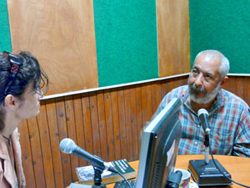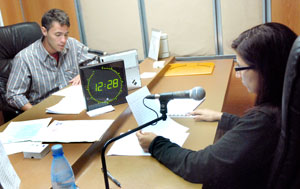Violeta Ramos: Padura, you are the first Cuban to receive this prestigious award which places you next to the great figures of Latin American literature. What does it mean for you having received this award?
Leonardo Padura: I’m very happy with this award. Such a prize is given now in three categories. One is given to a French writer, second to a Latin American writer and the third to an essayist that submits a book. In the category of Latin American authors, important Latin American writers have received it; they include Adolfo Bioy Casares, Alvaro Muti, Carlos Fuentes, Patrick Chamoiseau, Simone Schwarz-Bart, and René Depestre. So, the list of winners categorizes this award, as the prize allowance is quite symbolic. I am the first Cuban to win this award and to be in the list of the great Latin American contemporary writers means a lot to me.
VR: Your stories are read by readers from distant parts and different cultures. What are the codes that make your literature become universal?
LP: Well, Alejo Carpentier quoted Unamuno by saying: “We must find the universal in the core of the local issues as well as the limited, and eternal things (…) and I think that there are codes, behaviors, attitudes, ways to understand and express life that are considered universal. Our country has gone through different times in the last 50 years. As of 1990, a new stage in Cuban life began. Also a very convulsed universal stage started with overthrow of the socialist bloc, the fall of the Berlin Wall and all the weight of the world history fell on Cuba. I set myself out– I think I made it somehow- to write about Cuba taking into account a kind of literature connecting to the foreign readers. I’m lucky, since my novels have been translated into 15 languages. Part of my work has been published in remote places and with very different cultures. For example in Israel, Korea, and China the codes have been assimilated by the readers. In my opinion, language and situations go beyond a given context. In France, Italy, Germany, Portugal, I have gained a lot of readers. My work hasn’t turned me into a best seller. Actually I’m not that way, but I got the closeness and loyalty of many readers.
VR: What time did the research and writing of your latest novel “The man who loved dogs” take?
LP: Two years of research plus three years more of research and writing. So, you can not wait for the inspiration to start writing; I prefer it to come to me while working after much training and discipline. Even if you’re exhausted you know that you have to continue working next day. This book was just an idea at first, and then it became a feeling of possession, which made me to seek very complicated information for two years. I worked in libraries, with archives, books of that time and others that had been recently published in Spain in that time. I Also used literature written in French, Italian…. but mostly in Spanish, because there is new information about some issues I referred to like the Spanish Civil War, the role of the Communist International in Europe and Spain. With all this information, I felt that I was ready to start writing. But when I started it, I felt like I had been thrown overboard. New things appeared and I had to research further. For five years, I used to write in the morning, read in the afternoons, and then put it on file. This way, I made a chronology of over 700 pages, which included -year after year – all important events, characters, everything occurred during those years, when the novel was unfolding . This way I got informed, because in this case, the inspiration had to be supported by solid information and compared. Without that information I could not write.
VR: Padura, thank you for your time
LP: Thank you for inviting me to this show.





